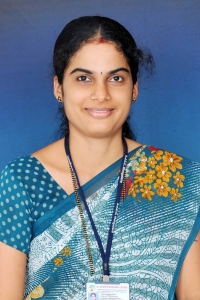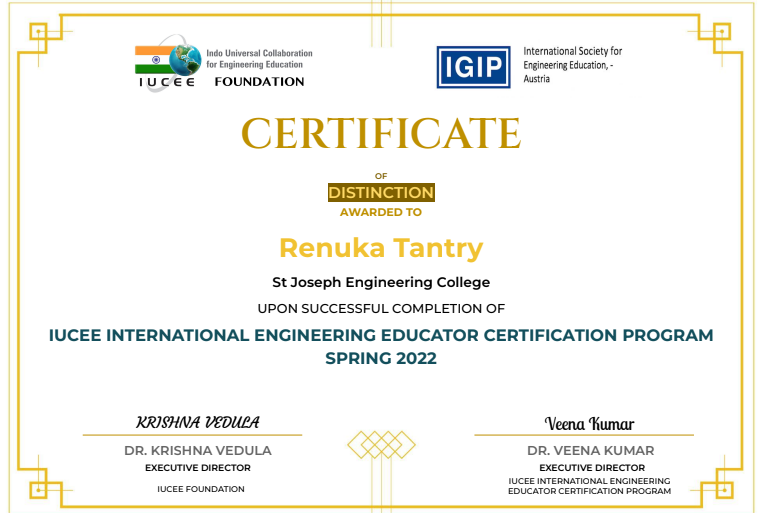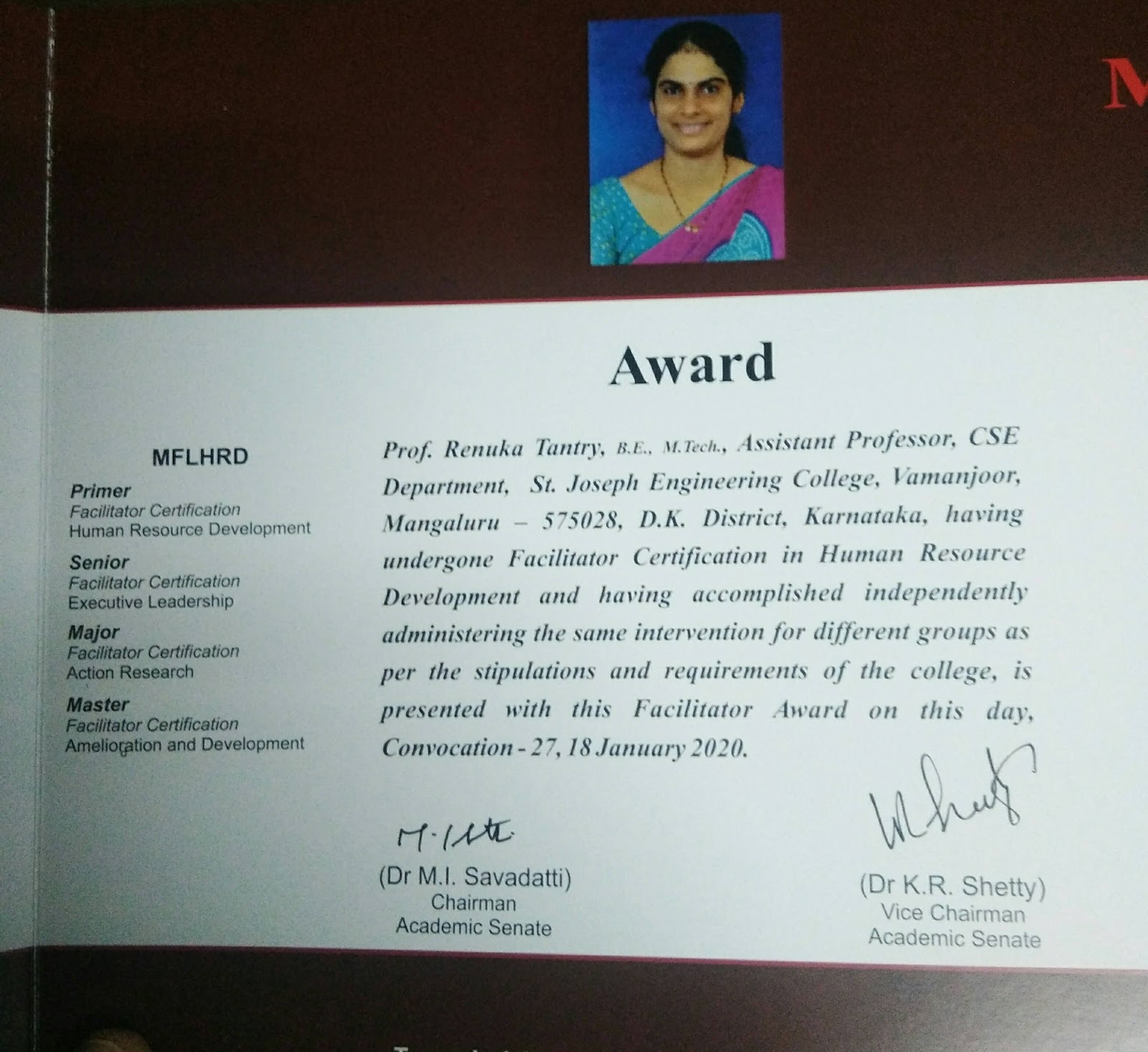
AssistantProfessor
Teaching is the one profession that creates all other professions. As a teacher I believe in developing strong relationships in order to establish a dynamic and highly effective learning environment.
My philosophy of education is that all students are unique and must have a stimulating educational environment where they can grow physically, mentally, emotionally, and socially.
As a teacher I can help an undergraduate students to develop the skills of information fluency: i.e. their ability to write and critically think about the concepts.
My goal is to become a professor at a quality oriented university. I believe in adopting new techniques and technologies in the classroom teaching.
| Sl.No | Qualification Level | University | Area of Specialization | Year of completion | Awards | ||||
|---|---|---|---|---|---|---|---|---|---|
| 1 | M.Tech | VTU | Computer Science | 2010 | |||||
Current:
Assistant Professor
05/2022 to till date
Department of ICBS
SJEC
Previous:
1)
Assistant Professor
7/2016 to 4/2022
Department Computer Science and Engineering
SJEC
2)
01/2011 to 7/2016
Assistant Professor
Department Information Science and Engineering
SJEC
3)
1/2010 to 12/2010
Sridevi Institute of Technology
Cognitive Technology
Affective Computing
Neural Networks
Artificial Intelligence
Machine Learning
Computer Networks
Authors: Cheryl L Mathias, Crystal F D’Souza, Job Alexander, Mariah S Hudson and Renuka Tantry
Publication Details: IOP Conf. Series: Materials Science and Engineering
DOI: 10.1088/1757-899X/1099/1/012015
Abstract: Retrieving digital records on the internet and capturing, uploading images on social media or other platforms has become such a notable part of one’s daily existence. Digital content and videos constitute majority of this ever-growing deluge of information. Major problems are faced by people on a daily basis when they have to manually scan large databases to search for particular images thereby exhausting valuable time and resources. To overcome this, Content Based Image Retrieval in addition to Emotion Detection must be performed to efficiently store and retrieve very specific images. An effective image clustering application should be capable
of accurately extracting images based on the given query image. It should also provide functionalities like Facial Detection and Recognition for customized usage and retrieval. In this study, texture-based feature extraction followed by the usage of a feed forward backpropagation neural network has been proposed for CBIR. For emotion detection, correlation has been proposed in addition to the Viola Jones algorithm which has been used for facial detection.
Authors: Mr. Shawn Rahul D’Souza, Mr. Rajil Paloth, Mrs. Renuka Tantry
Publication Details: International Journal of Emerging Technology and Advanced Engineering Website: www.ijetae.com (ISSN 2250-2459, ISO 9001:2008 Certified Journal, Volume 8, Issue 7, July 2018)
Abstract: As people are becoming more digitally adept to the world around them, they try to maximize their efficiency of finding solutions by using their personal devices. In this day and age, it boils down to the simple fact that there are more people who would be more inclined to use their device to answer their questions. Keeping this in mind, the paradigm has shifted from a simple text based query to a more conversationally adept user interface. With the onset of chatbots and conversational AIs taking the world by storm, it is safe to say that this concept will become one of the most trending features based on user responsiveness and data accountability. The Virtual Assistant for the Grocery Store was developed with the aim of implementing a conversational AI for the users to discover everything that they could ask for with respect to a single grocery store.
Authors: Shreejith K, Likith K, Gaurav K U, Shrinidhi K Rao, Renuka Tantry
Publication Details: International Journal of Emerging Technology and Advanced Engineering Website: www.ijetae.com (ISSN 2250-2459, ISO 9001:2008 Certified Journal, Volume 8, Issue 7, July 2018)
Abstract: It is fundamental right of human to get quality Health Care. Earlier days, people were unaware of the diseases they faced. They used the physical changes to determine the disease. But as the technology developed it also affected the Medical field. The methods of treatment got more effective. But still now a day’s people tend to ignore general diseases because of their busy schedule. People use Google as their personal Medical consultant which most of the doctors don’t suggest. To overcome this small issue, we come up with an idea which creates a platform for the interaction between the doctor and patient using IoT.
Authors: Merril Roshini Mathias, Rayan Rahul D’Souza, Sanjana Bhat H., Savina Jassica Colaco, Renuka Tantry
Publication Details: Advances in Computing 2017 7(2): 51-57
DOI: 10.5923/j.ac.20170702.09
Abstract A wireless ad hoc network (WANET) or MANET is a decentralized type of wireless network and it does not rely on a pre-existing infrastructure. Instead, each node participates in routing by forwarding data for other nodes, so the determination of which nodes forward data is made dynamically on the basis of network connectivity and the routing algorithm in use. The Temporally-Ordered Routing Algorithm (TORA) is an adaptive, distributed, loop-free routing protocol for multi-hop networks which has minimum overhead against topological changes. Quality of Service (QoS) support for MANET in TORA has become a challenging task due to its dynamic topology. This paper proposes QoS enabled Temporally Ordered Routing Algorithm using Ant Colony Optimization called AntTORA. ACO algorithms have shown to be a good technique for developing routing algorithms for ad hoc networks. ACO based routing is an efficient routing scheme based on the behaviour of foraging ants. The collective behaviour of ants helps to find the shortest path from the nest to a food source, by deposition of a chemical substance called pheromone on the visited nodes. ACO technique is used in TORA protocol to optimize multiple QoS metrics like end-to-end delay, throughput, jitter and so on. The performance of TORA and AntTORA are analysed using network simulator-2. The results presented in the end also help the researchers to understand the differences between TORA and AntTORA, therefore to choose appropriate protocol for their research work. Our simulation study shows how this approach has significantly improved the performance of the ad hoc networks.
Authors: Merril Roshini Mathias, Rayan Rahul D’Souza, Sanjana Bhat H., Savina Jassica Colaco, Renuka Tantry
Publication Details: Advances in Computing 2017 7(2): 51-57
DOI: 10.5923/j.ac.20170702.09
Abstract A wireless ad hoc network (WANET) or MANET is a decentralized type of wireless network and it does not rely on a pre-existing infrastructure. Instead, each node participates in routing by forwarding data for other nodes, so the determination of which nodes forward data is made dynamically on the basis of network connectivity and the routing algorithm in use. The Temporally-Ordered Routing Algorithm (TORA) is an adaptive, distributed, loop-free routing protocol for multi-hop networks which has minimum overhead against topological changes. Quality of Service (QoS) support for MANET in TORA has become a challenging task due to its dynamic topology. This paper proposes QoS enabled Temporally Ordered Routing Algorithm using Ant Colony Optimization called AntTORA. ACO algorithms have shown to be a good technique for developing routing algorithms for ad hoc networks. ACO based routing is an efficient routing scheme based on the behaviour of foraging ants. The collective behaviour of ants helps to find the shortest path from the nest to a food source, by deposition of a chemical substance called pheromone on the visited nodes. ACO technique is used in TORA protocol to optimize multiple QoS metrics like end-to-end delay, throughput, jitter and so on. The performance of TORA and AntTORA are analysed using network simulator-2. The results presented in the end also help the researchers to understand the differences between TORA and AntTORA, therefore to choose appropriate protocol for their research work. Our simulation study shows how this approach has significantly improved the performance of the ad hoc networks.

Attended 10 days workshop on "Human Resource Management", from 12-21 January 2019 at CLHRD, Kadri

Participated in one week online FDP on "Insights on Writing Research Proposals and Funding Opportunities", from 20 to 24 July 2020, organized by SJEC, Mangalore.
Participated in FDP on "Python Programming through INFYTQ Platform", organized by Infosys Limited, from 6 to 13 July 2020.
Participated in four days live webinar on "Research Methodologies and Data Analysis", from 17 to 20 June 2020, organized by Karnataka Science and Technology Academia.
Participated in four day online FDP on "Applied Machine learning using Python" , from 9 to 12 June 2020, organized by NMAM Institute of Technology, Nitte.
Attended a three days faculty development program on "MATLAB and its Applications", organized by St Joseph Engineering College, Mangalore, from 10 to 12 February 2020.
Attended a five days faculty development program on "Cyber Security and Blockchain Technology" organized by Yenepoya Institute of Technology, Moodbidri, from 20 to 24 January 2020.
Attended a three day Phase I workshop on "IUCEE International Engineer Educator Certificate", organized by SJEC.
Attended a five day FDP on "Machine Learning" held at SJEC from 23 to 27 July 2018.
Attended three days workshop on "Feel Teacher" Learning and development intervention, organized by SJEC, from 02 to 04 2018.
Attended a workshop on "Integra 2018-Course Design management ", organized by SJEC, from 16-18 July 2018.
Attended a workshop on "ARDUINO RAPID PROTOTYPING" held on 19 to 20 January 2018 at SJEC.
Attended Peer Enablement Program on Foundation program 5.0 of Infosys Campus Connect held from 11 to 12 January 2017 at SJEC.
Participated in two days FDP on Python from 9 to 10 January 2017 at SJEC.
Attended a workshop on "Computer Network Programming in Java and NS2", held from 10 to 12 August 2017, by SJBIT Bangalore.
Attended a workshop on "Open Source Network Experimentation", conducted by NITK, Suratkal form 1 to 3 June 2017.
Presented a paper titled "Artificial Intelligence based Smart Door with Face MaskDetection" in the second International conference on Data Analytics & Learning (ICDAL'zz) held at Alva's Institute of Engineering and Technology, Moodbidri, Mangaluru, Karnataka in association with the University of Mysore, Mysuru, Karnataka on 30th & 31st December, 2022.
© SJEC is Made with by Siona Solutions